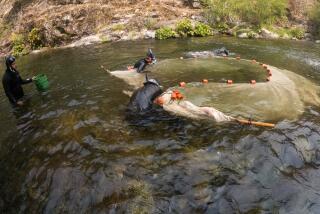Ruling Halts Some Loggers in Northwest
SEATTLE — Logging on thousands of acres in the Pacific Northwest was halted Thursday by a federal appeals court, which upheld a requirement for comprehensive new studies to protect fish from the potentially devastating effects of timber harvests.
The ruling from the U.S. 9th Circuit Court of Appeals is one of the strongest blows dealt by the Endangered Species Act on logging in recent years. It is expected to significantly delay at least two dozen timber sales in central Oregon and potentially as many as 170 logging plans on federal lands in Oregon, Washington and Northern California.
“This represents a significant part of our current sale program,” said Rex Holloway, spokesman for the U.S. Forest Service in Portland, Ore.
Forest Service officials said the ruling will block plans for logging at least 25 million to 30 million board feet in Oregon and potentially more than 150,000 acres of federal timberland in parts of three states.
Conservation groups called the ruling a significant step toward protecting endangered salmon and trout in the wild rivers of the Northwest from the silt-choked streams and elevated water temperatures that are some of logging’s deadliest effects.
“For them to survive, they need clean, pristine, freshwater environments, and the national forests offer some of the best habitat,” said Patti Goldman, who argued the case for the Earthjustice Legal Defense Fund in Seattle.
“The fear is that the real impacts of the logging would be overlooked, and the fish would suffer a death of a thousand cuts, since so many of the impacts to the salmon add up from multiple activities,” Goldman said.
But Mark Rutzick, an attorney for the Northwest Forestry Assn., a logging industry group, said there are already exhaustive federal procedures for protecting salmon and other affected fish. “This decision upsets a settled interagency process for evaluating timber sales, without telling [the agencies] what to replace it with,” he said.
The affected timber sales all lie within the scope of the Northwest Forest Plan brokered by the Clinton administration in 1994 to settle conflict over the spotted owl, an elusive species whose old-growth forest habitat was threatened by the federal government’s aggressive timber sales program during the 1980s.
Since then, sharply dwindling numbers of salmon and other river-dependent fish have sounded a much more widespread environmental alarm. Several species of salmon and trout are now in what the National Marine Fisheries Service calls “a serious, long-term state of decline,” and damaged habitat along the region’s wild rivers is considered one of the chief contributors to their march toward extinction.
With several fish species listed for protection under the Endangered Species Act, no timber sale on federal land along the Northwest coast has proceeded without approval from the National Marine Fisheries Service in recent years.
But a coalition of fishing and environmental groups sued to challenge the way the federal fisheries service was conducting those reviews, asserting, among other things, that the reviews needed to look at the effect of each individual timber sale, rather than reviewing logging effects in entire watersheds.
A federal judge in Seattle agreed, finding in October in favor of the conservation groups in a case involving 23 federal timber sales in the Umpqua River Basin near Roseburg, Ore. The judge expanded that finding in December to include up to 170 timber sales in Washington, Oregon and Northern California.
The appeals court decision Thursday technically applies only to the Umpqua Basin sales, but federal officials said it would likely set the standard for all future logging sales under the Northwest Forest Plan.
Potentially affected would be sales from the Klamath and Six Rivers national forests in California and the Gifford-Pinchot National Forest in central Washington.
In an opinion written by Judge Alfred T. Goodwin, the appeals court for the most part upheld the lower court ruling. “Unless the effects of individual projects are aggregated to ensure that their cumulative effects are perceived and measured in future [endangered species] consultations, it is difficult to have any confidence in a wide, regional no-jeopardy opinion,” the court said.
The court also rejected the assertion of the fisheries service that regrowth of trees in localized areas would quickly mitigate any effect of cutting them. “This optimism may be justified for the purpose of counting trees, but for the purpose of counting anadromous fish, it is wholly unrealistic,” the judges said.
Federal officials said they have always sought full protection of salmon habitat in federal timber sales, though they believed that protection was best measured on a broad-brush scale.
More to Read
Sign up for Essential California
The most important California stories and recommendations in your inbox every morning.
You may occasionally receive promotional content from the Los Angeles Times.










